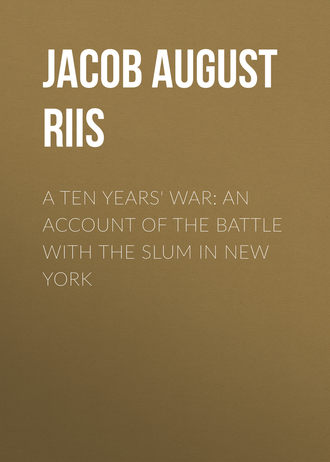 полная версия
полная версияA Ten Years' War: An Account of the Battle with the Slum in New York
Odd as it sounds, this is where he has his real hold. I have shown why this is so. To the poor people of his district the boss is a real friend in need. He is one of them. He does not want to reform them; far from it. No doubt it is very ungrateful of them, but the poor people have no desire to be reformed. They do not think they need to be. They consider their moral standards quite as high as those of the rich, and resent being told that they are mistaken. The reformer comes to them from another world to tell them these things, and goes his way. The boss lives among them. He helped John to a job on the pipes in their hard winter, and got Mike on the force. They know him as a good neighbor, and trust him to their harm. He drags their standard ever farther down. The question for those who are trying to help them is how to make them transfer their allegiance, and trust their real friends instead.
It ought not to be a difficult question to answer. Any teacher could do it. He knows, if he knows anything, that the way to get and keep the children's confidence is to trust them, and let them know that they are trusted. They will almost always come up to the demand thus made upon them. Preaching to them does little good; preaching at them still less. Men, whether rich or poor, are much like children. The good in them is just as good as it is said to be, and the bad, considering their enlarged opportunities for mischief, not so much worse than it is called. A vigorous optimism, a stout belief in one's fellow man, is better equipment in a campaign for civic virtue than stacks of tracts and arguments, economic and moral, are. There is good bottom, even in the slum, for that kind of an anchor to get a grip on. A year ago I went to see a boxing match there had been much talk about. The hall was jammed with a rough and noisy crowd, hotly intent upon its favorite. His opponent, who hailed, I think, from somewhere in Delaware, was greeted with hostile demonstrations as a "foreigner." But as the battle wore on, and he was seen to be fair and manly, while the New Yorker struck one foul blow after another, the attitude of the crowd changed rapidly from enthusiastic approval of the favorite to scorn and contempt; and in the last round, when he knocked the Delawarean over with a foul blow, the audience rose in a body and yelled to have the fight given to the "foreigner," until my blood tingled with pride. For the decision would leave it practically without a cent. It had staked all it had on the New Yorker. "He is a good man," I heard on all sides, while the once favorite sneaked away without a friend. "Good" meant fair and manly to that crowd. I thought, as I went to the office the next morning, that it ought to be easy to appeal to such a people with measures that were fair and just, if we could only get on common ground. But the only hint I got from my reform paper was an editorial denunciation of the brutality of boxing, on the same page that had an enthusiastic review of the college football season. I do not suppose it did any harm, for the paper was probably not read by one of the men it had set out to reform. But suppose it had been, how much would it have appealed to them? Exactly the qualities of robust manliness which football is supposed to encourage in college students had been evoked by the trial of strength and skill which they had witnessed. As to the brutality, they knew that fifty young men are maimed or killed at football to one who fairs ill in a boxing match. Would it seem to them common sense, or cant and humbug?
It comes down in the end to a question of common sense and common honesty. For how many failures of reform effort is insincerity not to blame! Last spring I attended a meeting at Albany that had been called by the governor to discuss the better enforcement of the labor laws. We talked the situation over, and Mr. Roosevelt received from those present their ready promise to aid him in every way in making effective the laws that represented so much toil and sacrifice, yet had until then been in too many instances barren of results. Some time after, a workingman told me with scorn how, on our coming home, one of our party had stopped in at the factory inspector's office to urge him to "let up" on a friend, a cigar manufacturer, who was violating a law for which the labor organizations had fought long years as absolutely necessary to secure human conditions in the trade. How much stock might he and his fellows be supposed to take in a movement that had such champions? "You scratch my back and I'll scratch yours," is a kind of politics in which the reformer is no match for the boss. The boss will win on that line every time. A saving sense of humor might have avoided that and many other pitfalls. I am seriously of the opinion that a professional humorist ought to be attached to every reform movement, to keep it from making itself ridiculous by either too great solemnity or too much conceit. As it is, the enemy sometimes employs him with effect. Failing the adoption of that plan, I would recommend a decree of banishment against photographers, press-clippings men, and the rest of the congratulatory staff. Why should the fact that a citizen has done a citizen's duty deserve to be celebrated in print and picture, as if something extraordinary had happened? The smoke of battle had not cleared away after the victory of reform, in the fall of 1894, before the citizens' committee and all the little sub-committees rushed pell-mell to the photographer's to get themselves on record as the men who did it. The spectacle might have inspired in the humorist the advice to get two sets made, while they were about it,—one to serve by and by as an exhibit of the men who didn't; and, as the event proved, he would have been right.
But it is easy to find fault, and on that tack we get no farther. Those men did a great work, and they did it well. The mile-posts they set up on the road to better things will guide another generation to the goal, however the present may go astray. Good schools, better homes, and a chance for the boy are arguments that are not lost upon the people. They wear well. It may be that, like Moses and his followers, we of the present day shall see the promised land only from afar and with the eye of faith, because of our sins; that to a younger and sturdier to-morrow it shall be given to blaze the path of civic righteousness that was our dream. I like to think that it is so, and that that is the meaning of the coming of men like Roosevelt and Waring at this time with their simple appeal to the reason of honest men. Unless I greatly err in reading the signs of the times, it is indeed so, and the day of the boss and of the slum is drawing to an end. Our faith has felt the new impulse; rather, I should say, it has given it. The social movements, and that which we call politics, are but a reflection of what the people honestly believe, a chart of their aims and aspirations. Charity in our day no longer means alms, but justice. The social settlements are substituting vital touch for the machine charity that reaped a crop of hate and beggary. They are passenger bridges, it has been truly said, not mere "shoots" for the delivery of coal and groceries; bridges upon which men go over, not down, from the mansion to the tenement. We have learned that we cannot pass off checks for human sympathy in settlement of our brotherhood arrears. The church, which once stood by indifferent, or worse, is hastening to enter the life of the people. In the memory of men yet living, one church, moving uptown away from the crowd, left its old Mulberry Street home to be converted into tenements that justly earned the name of "dens of death" in the Health Department's records, while another became the foulest lodging house in an unclean city. It was a church corporation which in those bad days owned the worst underground dive downtown, and turned a deaf ear to all remonstrances. The church was "angling for souls." But souls in this world live in bodies endowed with reason. The results of that kind of fishing were empty pews and cold hearts, and the conscience-stricken cry that went up, "What shall we do to lay hold of this great multitude that has slipped from us?"
Ten years have passed, and to-day we see the churches of every denomination uniting in a systematic canvass of the city to get at the facts of the people's life of which they had ceased to be a part, pleading for parks, playgrounds, kindergartens, libraries, clubs, and better homes. There is a new and hearty sound to the word "brother" that is full of hope. The cry has been answered. The gap in the social body, between rich and poor, is no longer widening. We are certainly coming closer together. Ten years ago, when the King's Daughters lighted a Christmas tree in Gotham Court, the children ran screaming from Santa Claus as from a "bogey man." Last Christmas the boys in the Hebrew Institute's schools nearly broke the bank laying in supplies to do him honor. I do not mean that the Jews are deserting to join the Christian church. They are doing that which is better,—they are embracing its spirit; and they and we are the better for it. God knows we waited long enough; and how close we were to each other all the while without knowing it! Last Christmas a clergyman, who lives out of town and has a houseful of children, asked me if I could not find for them a poor family in the city with children of about the same ages, whom they might visit and befriend. He worked every day in the office of a foreign mission in Fifth Avenue, and knew little of the life that moved about him in the city. I picked out a Hungarian widow in an East Side tenement, whose brave struggle to keep her little flock together had enlisted my sympathy and strong admiration. She was a cleaner in an office building; not until all the arrangements had been made did it occur to me to ask where. Then it turned out that she was scrubbing floors in the missionary society's house, right at my friend's door. They had passed each other every day, each in need of the other, and each as far from the other as if oceans separated them instead of a doorstep four inches wide.
Looking back over the years that lie behind with their work, and forward to those that are coming, I see only cause for hope. As I write these last lines in a far distant land, in the city of my birth, the children are playing under my window, and calling to one another with glad cries in my sweet mother tongue, even as we did in the long ago. Life and the world are before them, bright with the promise of morning. So to me seem the skies at home. Not lightly do I say it, for I have known the toil of rough-hewing it on the pioneer line that turns men's hair gray; but I have seen also the reward of the toil. New York is the youngest of the world's great cities, barely yet out of its knickerbockers. It may be that the dawning century will see it as the greatest of them all. The task that is set it, the problem it has to solve and which it may not shirk, is the problem of civilization, of human progress, of a people's fitness for self-government that is on trial among us. We shall solve it by the world-old formula of human sympathy, of humane touch. Somewhere in these pages I have told of the woman in Chicago who accounted herself the happiest woman alive because she had at last obtained a playground for her poor neighbors' children. "I have lived here for years," she said to me, "and struggled with principalities and powers, and have made up my mind that the most and the best I can do is to live right here with my people and smile with them,—keep smiling; weep when I must, but smile as long as I possibly can." And the tears shone in her gentle old eyes as she said it. When we have learned to smile and weep with the poor, we shall have mastered our problem. Then the slum will have lost its grip and the boss his job.
Until then, while they are in possession, our business is to hold taut and take in slack right along; never letting go for a moment.
1
Police census of 1895: Block bounded by Canal, Hester, Eldridge, and Forsyth streets: size 375 × 200, population 2628, rate per acre 1526. Block bounded by Stanton, Houston, Attorney, and Ridge streets: size 200 × 300, population 2244, rate per acre 1774.
2
There is an advanced outpost of blacks as far up as One Hundred and Forty-Fifth Street, but the main body lingers yet among the sixties.
3
According to the register of the United Hebrew Charities, between October 1, 1884, and March 1, 1899, the number was 402,181.
4
Year-Book of Elmira State Reformatory, 1897. The statistics deal with 8319 prisoners received there in twenty-three years. The social stratum whence they came is sufficiently indicated by the statement that 18.3 per cent. were illiterates, and 43.3 per cent. were able to read and write with difficulty; 35.2 per cent. had an ordinary common school education; 3.2 per cent. came out of high schools or colleges.
5
The name was bestowed before the fact, not after.
6
I set down reluctantly this censure of an honored profession, to individual members of which I have been wont, in a long succession of troubled years, to go for advice and help in public matters, and never in vain. The statement of the chief sanitary officer of the Health Department, reaffirmed at the time I am writing, is, however, positive to the effect that to this opposition, and this only, was due the failure of that much-needed reform which had for years been with me a pet measure.
7
The exact number for April, 1899, was 9989; number of pupils registered, 401,761; average daily attendance, 370,722.
8
The teacher's pay, under the new act, is from $600 to $1400. The policeman's pay is $1400.









